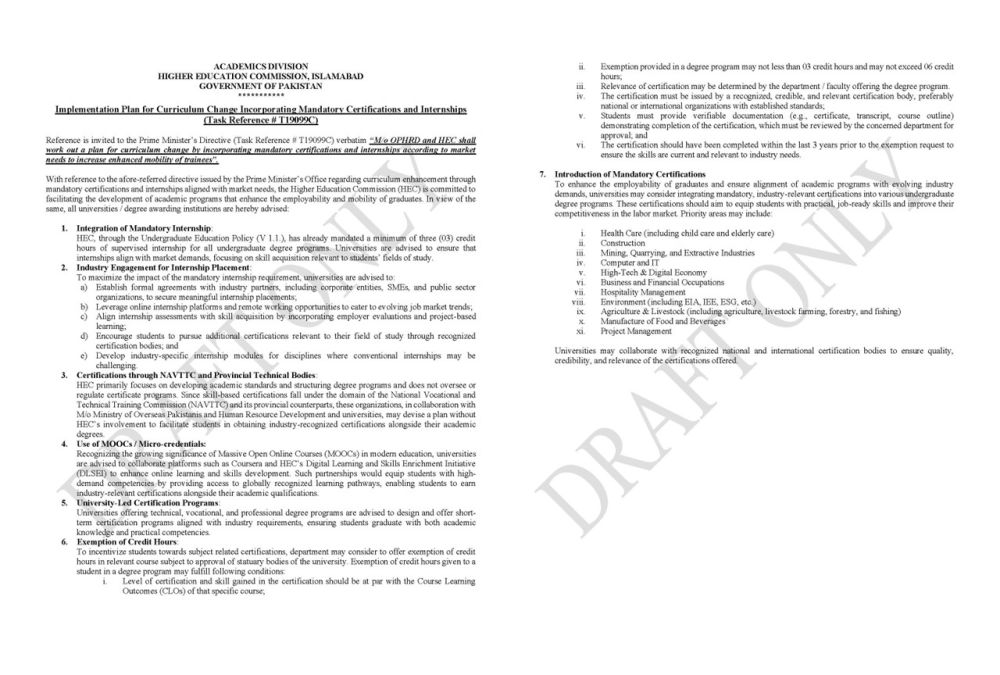185/25 Mandatory Certifications and Internships to Boost Graduate Employability in Pakistan
Posted 5 months ago
Executive Summary
Pakistan’s Higher Education Commission (HEC), acting on a directive from the Prime Minister, has proposed curriculum reforms to embed mandatory certifications and internships into university programs. The initiative aims to close the gap between academia and industry by equipping graduates with practical, job-ready skills alongside their degrees.
The benefits are clear: enhanced employability, stronger industry-academia collaboration, sector-specific training in high-demand areas like healthcare, IT, and environment, and greater global competitiveness for Pakistani graduates. Partnerships with MOOCs and certification bodies further expand access to world-class skills development.
However, challenges loom large. Implementation capacity varies across universities, equity concerns may leave disadvantaged students behind, and quality assurance of certifications remains a critical hurdle. Without careful execution, the reform risks becoming a compliance exercise rather than a transformative shift.
Still, the advisory marks a pivotal step in reshaping Pakistan’s higher education landscape. By placing skills at the heart of degrees, it signals a new era where universities must deliver not just knowledge but workforce readiness.
To align academia with industry, Pakistan’s Higher Education Commission (HEC) has rolled out a framework to incorporate mandatory certifications and internships into university curricula. The initiative, subsequent to directive from the Prime Minister’s Office, seeks to bridge the country’s persistent gap between higher education and employability by ensuring that graduates emerge with academic knowledge and practical, job-ready skills.
Several universiteis in the country including University of Southern Punjab Multan (USP) and the National Skills University Islamabad already have such initiatives in place. Particularly, the USP initiative #USPSkillingU aligns with the priorities outlined in this letter.
At its core, the plan pushes universities to institutionalize internships, forge meaningful partnerships with industry, and incentivize students to acquire recognized certifications through national, provincial, or global platforms. Fields like healthcare, IT, digital economy, construction, agriculture, and environmental management are recognized as priority sectors. To strengthen the shift, the advisory even allows universities to grant credit-hour exemptions for relevant certifications, effectively rewarding students for real-world skill acquisition.
Why This Matters: The Benefits
This directive has the potential to be a game-changer for a nation with one of the youngest populations in the world. Employers have long bemoaned the fact that graduates leave universities ill-prepared for market realities. By embedding certifications and internships into degree programs, this initiative directly addresses this mismatch, offering a hopeful vision for the future of education in Pakistan.
Enhanced Employability: By combining degrees with industry-recognized certifications, students will graduate with a significantly stronger competitive edge, both locally and globally, instilling a sense of confidence in the potential of this initiative.
Industry Integration: Structured internships and employer evaluations ensure closer ties between academia and the corporate sector.
Flexibility through MOOCs: Partnerships with platforms like Coursera and HEC’s DLSEI can democratize access to global learning, especially for students outside urban centers.
Sectoral Relevance: Targeted certifications in healthcare, IT, environment, and agriculture not only address Pakistan’s labor needs but also create pathways for overseas employment.
Constructive Critique:
Yet, as with any sweeping reform, execution will determine its success. There are real concerns that must be taken into consideration:
Implementation Capacity: Many universities, especially smaller or resource-strapped institutions, lack the infrastructure and industry linkages to deliver quality internships.
Equity Concerns: Students from rural or lower-income backgrounds may struggle to afford global certifications or access quality placements. Without subsidies, the initiative risks widening educational inequality.
Quality Assurance: While exemptions for credit hours tied to certifications are innovative, ensuring that only credible, standardized certifications qualify will be challenging.
Overburdening Students: If poorly integrated, mandatory certifications could pile pressure on students already navigating heavy academic loads.
The Way Forward
To ensure the success of this initiative, it is crucial that HEC and universities collaborate with NAVTTC, provincial skills providing TEVTAs, industry, and international certification bodies. Scholarships or state-funded vouchers for disadvantaged students could prevent inequity, while strict oversight of certification standards is essential to maintaining credibility. This emphasis on collaboration and oversight should instill a sense of security and trust in the initiative's potential.
HunarNama’s Role
It is worth applauding HunarNama’s Editor-in-Chief for spotlighting this advisory at a critical juncture. In a landscape where policies sometimes get lost due to existing ground realities, HunarNama has provided an essential platform for debate. By engaging educators, students, and industry voices, the magazine ensures this initiative is not just a paper directive but the start of a national conversation on the future of higher education in Pakistan.





